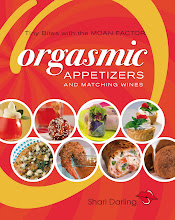 Kidney Burger Recipe and Wine Pairing Below
Kidney Burger Recipe and Wine Pairing BelowIf I had only one food and one beverage from which to choose, it would be a T-bone steak and a glass of red wine. In an effort to reduce my calorie, fat and frequent consumption of meat, make a few changes for the New Year, I’ve been studying the many benefits of beans, specifically kidneys. When combined with brown rice, this common bean provides an excellent source of protein – without the high calories and fat content of red meat! In fact, one cup of kidney beans provides 15.3 grams of protein, 30% of one’s daily requirement.
Like most beans, kidneys are also an excellent source of cholesterol lowering fiber. Hypoglycemic and diabetic friendly, these beans help to stabilize blood sugar levels after meals.
One of the best benefits of kidneys, I believe, is that they are h igh in ‘molybdenum.’ Molybdenum is a trace mineral and an important part of the enzyme sulfite oxidase, which is responsible for detoxifying sulfites in the body.
igh in ‘molybdenum.’ Molybdenum is a trace mineral and an important part of the enzyme sulfite oxidase, which is responsible for detoxifying sulfites in the body.
One cup of cooked kidney beans supplies about 177.0% of our molybdenum daily requirement. I checked my multivitamin. It contains 8 mcg of this trace mineral. For the human being, 75 mcg of molybdenum is a daily requirement. So, kidney beans are now a part of my weekly repertoire.
Molybdenum is believed to help to protect the stomach and esophagus against cancers, aids in the absorption of iron and so helps to prevent anemia, as well as tooth decay. Molybdenum also aids in the metabolizing of fats and carbohydrates. (Other than kidney beans, other foods high in molybdenum are meats, whole brains, buckwheat, barley, wheat germ, lima beans, sunflower seeds and dark green leafy vegetables.)
Most importantly, kidney beans are high in soluable and insoluable fibre. Soluable fibre produces a gel-like substance that increases stool bulk and therefore helps to prevent constipation.
When buying kidney beans at bulk food stores, look closely to ensure they are not cracked, thus indicating too much moisture content.
To prepare dried kidneys quickly and for culinary greatness, rinse the beans under cool water. Place them in a pot on a burner with just enough water to cover. Bring the water to a boil and then let the beans simmer for 2 minutes. Remove the pan from the heat. Let the beans stand in their liquid for two hours. Remove the beans from this liquid. Discard the liquid. Rinse the beans again under cool water again. Put them into a clean pot. Add 3 cups of water to every 1 cup of beans. Bring the water to a boil, reduce the heat to simmer. Let the kidneys cook for another 1.5 to 2 hours until soft and done.
One of the best benefits of kidneys, I believe, is that they are h
 igh in ‘molybdenum.’ Molybdenum is a trace mineral and an important part of the enzyme sulfite oxidase, which is responsible for detoxifying sulfites in the body.
igh in ‘molybdenum.’ Molybdenum is a trace mineral and an important part of the enzyme sulfite oxidase, which is responsible for detoxifying sulfites in the body.One cup of cooked kidney beans supplies about 177.0% of our molybdenum daily requirement. I checked my multivitamin. It contains 8 mcg of this trace mineral. For the human being, 75 mcg of molybdenum is a daily requirement. So, kidney beans are now a part of my weekly repertoire.
Molybdenum is believed to help to protect the stomach and esophagus against cancers, aids in the absorption of iron and so helps to prevent anemia, as well as tooth decay. Molybdenum also aids in the metabolizing of fats and carbohydrates. (Other than kidney beans, other foods high in molybdenum are meats, whole brains, buckwheat, barley, wheat germ, lima beans, sunflower seeds and dark green leafy vegetables.)
Most importantly, kidney beans are high in soluable and insoluable fibre. Soluable fibre produces a gel-like substance that increases stool bulk and therefore helps to prevent constipation.
When buying kidney beans at bulk food stores, look closely to ensure they are not cracked, thus indicating too much moisture content.
To prepare dried kidneys quickly and for culinary greatness, rinse the beans under cool water. Place them in a pot on a burner with just enough water to cover. Bring the water to a boil and then let the beans simmer for 2 minutes. Remove the pan from the heat. Let the beans stand in their liquid for two hours. Remove the beans from this liquid. Discard the liquid. Rinse the beans again under cool water again. Put them into a clean pot. Add 3 cups of water to every 1 cup of beans. Bring the water to a boil, reduce the heat to simmer. Let the kidneys cook for another 1.5 to 2 hours until soft and done.
1 cup cooked brown rice.
1/3 cup chopped red onion
1/2 cup dry bread crumbs
1/2 cup bottled chunky salsa
1 tsp cumin
sea salt and pepper to taste
Vegetable oil (as needed)
2 whole-wheat hamburger buns
slices of cucumber as needed
sprouts of choice
Place beans and brown rice in a food processor. Puree until chunky. Transfer to a bowl. Fold in the onion, breadcrumbs, 2 tablespoons of the salsa, and cumin. Add more salsa if mixture is too dry. Season with salt and pepper. Using moistened hands, shape bean mixture into two (3- to 4-inch-diameter) patties. Prepare the electric grill. Spray the grill with non stick cooking spray. Grill burgers until heated through, about 3 minutes per side. Grill cut sides of buns until lightly toasted, about 1 minute. Transfer burgers to bottom halves of buns. Spoon remaining salsa over each burger. Add slices of cucumber and favourite sprouts. Cover with tops of buns.
1/3 cup chopped red onion
1/2 cup dry bread crumbs
1/2 cup bottled chunky salsa
1 tsp cumin
sea salt and pepper to taste
Vegetable oil (as needed)
2 whole-wheat hamburger buns
slices of cucumber as needed
sprouts of choice
Place beans and brown rice in a food processor. Puree until chunky. Transfer to a bowl. Fold in the onion, breadcrumbs, 2 tablespoons of the salsa, and cumin. Add more salsa if mixture is too dry. Season with salt and pepper. Using moistened hands, shape bean mixture into two (3- to 4-inch-diameter) patties. Prepare the electric grill. Spray the grill with non stick cooking spray. Grill burgers until heated through, about 3 minutes per side. Grill cut sides of buns until lightly toasted, about 1 minute. Transfer burgers to bottom halves of buns. Spoon remaining salsa over each burger. Add slices of cucumber and favourite sprouts. Cover with tops of buns.
Wine Suggestion: The tangy salsa demands a crisp, dry white wine, such as Sauvignon Blanc, dry Riesling, pinot gris or VinhoVerde.
If you choose to add a lot of cayenne heat to the burger, choose an off dry white wine with a hint of sweetness. The sweetness in the wine will offset the heat and spice.






No comments:
Post a Comment